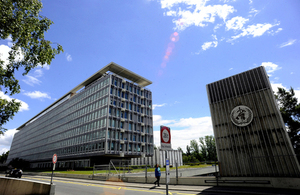World Health Assembly 70: UK opening statement
The UK statement delivered by Minister Rory Stewart at the 70th World Health Assembly in Geneva on 22 May 2017.

The World Health Assembly takes place at the Palais des Nations. The World Health Organization is headquartered in Geneva.
It’s often easy standing in this building with this history to feel a little bit bewildered and overwhelmed. But I think the message of the WHO and the message of Margaret Chan is a message that should give us a great sense of pride and a great sense of optimism. It’s often difficult communicating to our publics what happens in arenas like this; it’s difficult communicating to ordinary people how much has been achieved.
The WHO in particular has achieved an enormous amount. You certainly don’t need me to remind you of the incredible progress that was made on smallpox or the 40 per cent reduction in TB between 1990 and 2010. But more broadly, in general how much you collectively have achieved on mortality rates, on maternal health, on key diseases.
I would like to take a brief opportunity to join everybody in paying tribute to Margaret Chan because for 10 years she has shown, in so many ways, great leadership. We can point to individual interventions that she has taken, the WHO Health Emergency Programme for example. But speaking personally, I feel that it is her personal qualities, her energy, her intelligence, her integrity, and her commitment to the task.
As Britain therefore we remain deeply committed to this institution, beyond anything individual, proud of the WHO as an institution. Proud that as one of the countries here that commits 0.7 per cent of our GNI to international development, we will continue to invest a substantial portion of that in the WHO and it’s work.
As everybody has said in their speeches today, we are entering a new world, a world in which we are struggling with shifts in focus from communicable diseases to non-communicable diseases. We’re dealing with aging, we’re dealing with a world in which technocratic solutions are increasingly being replaced with much more complex societal interventions. And all of this, which has been said again and again, while it is very easy for someone like me to say, is very difficult to do. What you have proved in this room and what I hope we can continue to demonstrate over the next 10 or 20 years is the way in which people matter.
It’s very easy for me to stand up here and talk in the abstract and use this kind of jargon but it is the ministers of health, the communities, the doctors on the ground, the understanding of local politics and society in the fullest sense that will actually allow us to address these issues in the forthcoming years. Anti-Microbial Resistance is of course an example of one of the ways in which we demonstrate this day by day. It demonstrates the WHO’s role, the role of UN interagency processes, and the ways in which these connect with local communities and connect with simple things such as hand washing and the choices that an individual family makes on antibiotics.
To conclude therefore, I feel that we have a great decade ahead, a decade where we can feel proud and confident of the WHO. Where we can see the WHO’s vital role in shaping research, in setting standards, in bringing evidence-based policy to bear. Linking wellbeing to all of the Sustainable Development Goals is something of which we can be deeply proud. But I’m aware also, as a Minister, that a great deal of what I say will end up being platitudes. It is you in this room and billions of those not in this room who are really going to make this work. So thank you for all you’ve done, and a particular thank you to Margaret Chan. I feel collectively we should take pride, we should take confidence in what we have done in the past, and what we will achieve in the future.